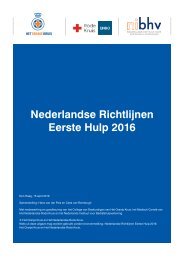Thesis-Anne-Vos-Masters-SBR-and-EU-Law-3
Thesis-Anne-Vos-Masters-SBR-and-EU-Law-3
Thesis-Anne-Vos-Masters-SBR-and-EU-Law-3
Create successful ePaper yourself
Turn your PDF publications into a flip-book with our unique Google optimized e-Paper software.
ectification at the source – requires environmental pollution to be cured at the source. By allowing<br />
shale gas activities, another energy source is introduced <strong>and</strong> invested into. However, this type of<br />
energy is not a ‘cure at the source’ (with regard to sustainable development, combating climate<br />
change, etc.), but is even accompanied by many environmental risks at the source. Moreover,<br />
introducing a new type of (non-renewable) energy costs a lot of time, effort <strong>and</strong> energy, also with<br />
regard to the public debate. It has been argued that all this could have been invested in a search<br />
for (new) renewable energy resources, which would have also contributed to the prevention <strong>and</strong><br />
integration principles. However, this is not a legal obligation, but concerns political will.<br />
Final conclusion<br />
When analysing these findings, it seems that (overall) the current <strong>and</strong> upcoming shale gas<br />
regulation is not in compliance with the ratio of the general <strong>and</strong> environmental principles.<br />
Moreover, it seems that especially those parts (that are not in compliance) are the parts that cause<br />
problems with the environment <strong>and</strong> the society. When applying the principles correctly, they can<br />
precisely contribute to addressing the problems of the current <strong>and</strong> upcoming <strong>EU</strong> <strong>and</strong> Dutch<br />
regulations. This could be illustrated by the problem of public acceptance. It seems that the current<br />
<strong>and</strong> upcoming <strong>EU</strong> <strong>and</strong> Dutch regulation is not in line with several principles, under which the<br />
integration, transparency, participation, integration <strong>and</strong> environmental principles. A strict(er)<br />
application of those principles, e.g. the transparency <strong>and</strong> participation principles, could enhance<br />
the problem of public trust <strong>and</strong> acceptance.<br />
Although these principles are not legally binding per se (unless incorporated into binding law or<br />
regulation), the principles (especially taken all together) do give a certain line of reasoning from<br />
which it should not be possible to deviate. Or at least, this should not be easy <strong>and</strong> be very well<br />
motivated. This is currently missing in the <strong>EU</strong> Recommendation on shale gas <strong>and</strong> the available<br />
Dutch documents on the upcoming Structure Vision on Shale Gas.<br />
7.2 Recommendations<br />
These conclusions show that an adjustment or an additional motivation of the current <strong>EU</strong><br />
Recommendation <strong>and</strong> the Draft MSL is necessary. These recommendations will concern the<br />
question how those principles can be used when doing this. The addressing of these problems is<br />
necessary in order to go through with these activities. Otherwise, many protests <strong>and</strong> delays will<br />
occur, which could in the end even lead to an actual (definitive) legal ban. Hereafter, eight practical<br />
recommendations will be proposed in order to make the current <strong>and</strong> upcoming regulation in line<br />
with the reasoning <strong>and</strong> ratio of the discussed general <strong>and</strong> environmental principles.<br />
1. First of all, especially with regard to the Netherl<strong>and</strong>s, the lower authorities should be more<br />
involved, or at least should better be cooperated with, when deciding on important decisions with<br />
regard to shale gas activities. They could for example be added as a formal advisor in the Mining<br />
Act. This is especially important since the actual carrying out of the shale gas activities happens in<br />
the ‘backyard’ of the citizens of the municipalities (<strong>and</strong> provinces). This would not only enhance the<br />
public acceptance <strong>and</strong> trust, it would also speed up the process <strong>and</strong> give a decision in which all the<br />
interests are better weighed. Hence, it would lead to better decision-making.<br />
2. Second of all, companies carrying out shale gas projects should be obliged by the Dutch<br />
government to make the shale gas operations transparent. This could be done by setting<br />
obligations to make public all the chemicals used in the fracturing fluid <strong>and</strong> flow back water, the<br />
spread emissions in the air, the amount of water, etc. This is already done by the (formally nonbinding)<br />
Recommendation. The problem of non-transparency is one of the main concerns that lead<br />
to the non-acceptance of the public. Moreover, it would enhance the position of the drinking water<br />
companies, who are then actually able to fulfil their duty of care. Finally, this would lead to a better<br />
101



